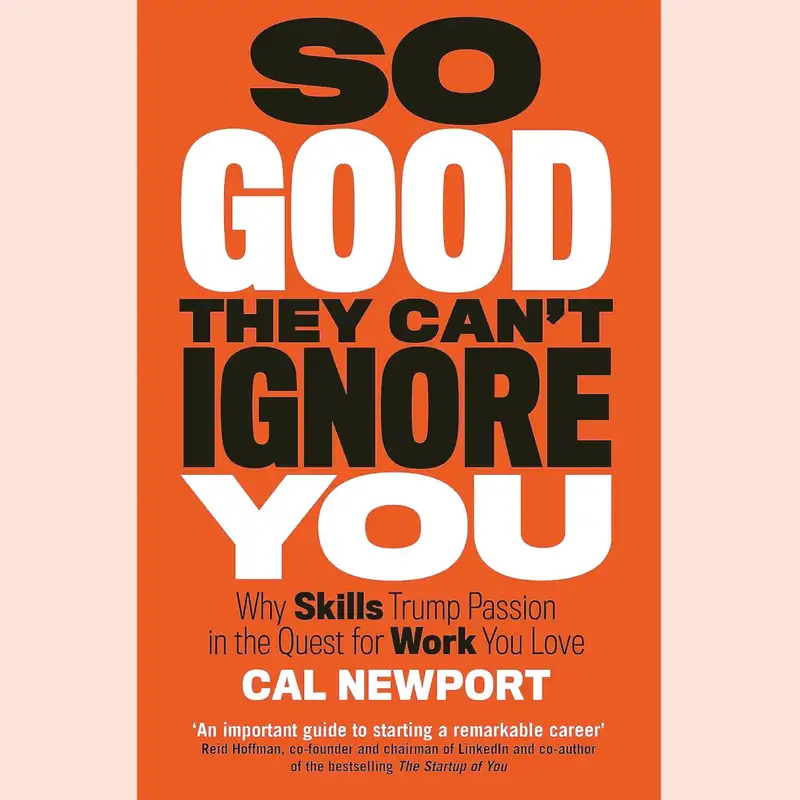So Good They Can’t Ignore You by Cal Newport
Summary: So Good They Can’t
Ignore You by Cal Newport
In So Good They Can’t Ignore You: Why Skills Trump Passion in the Quest
for Work You Love, Cal Newport challenges the popular notion that
following one’s passion is the surest way to career satisfaction. Instead, he
advocates for a practical and disciplined approach centered on skill-
building, or “career capital.” Newport posits that a fulfilling career is not
born from a preexisting passion but built over time through deliberate
practice, accumulating valuable skills, and pursuing meaningful, mission-
driven work.
The Passion Hypothesis vs. The Craftsman
Mindset
Newport opens by critiquing the “Passion Hypothesis,” the belief that the
key to career fulfillment is identifying and following a preexisting passion.
This approach is flawed in preexisting Newport because it implies that
people have intrinsic passions waiting to be discovered and that these
passions should dictate career choices. He suggests that unthinkingly
pursuing passion often leads to frustration and job-hopping as people
search for an ideal fit that may not exist.
Instead, Newport introduces the “Craftsman Mindset,” a perspective
focused on mastering skills and creating value in one’s field. He argues
that people can achieve satisfaction and control over their careers by
concentrating on excellence and skill-building. Newport writes, “The
passion mindset asks, ‘What can the world offer me?’ The craftsman
mindset asks, ‘What can I offer the world?’” This shift in perspective
reframes pursuing a fulfilling career as a journey of mastering skills and
providing value, leading to long-term engagement and fulfillment.
Building Career Capital: The Foundation of
Career Satisfaction
One of Newport’s central ideas is “career capital,” which he defines as the
rare and valuable skills that give individuals leverage in the workplace.
These skills allow people to negotiate for the kind of work they find
meaningful, gain autonomy, and make an impact in their field. Newport
insists that career capital is essential for creating the satisfying and
flexible career many people desire. “You have to be so good that they
can’t ignore you,” he states, emphasizing the need to acquire expertise
and depth in one’s work.
Career capital doesn’t come from chasing an idealized version of a job or
constantly switching roles; instead, it’s earned through hard work,
persistence, and a commitment to excellence. Newport argues that
achieving autonomy or gaining control over one’s work environment is
challenging without this capital. He says, “The traits that define great
work are rare and valuable. If you want them in your career, you need rare
and valuable skills to offer in return.”
The Role of Deliberate Practice in Building
Expertise
Mastery and expertise are the cornerstones of Newport’s career strategy,
and he highlights deliberate practice as the most effective method for
achieving them. Newport explains that deliberate practice requires
consistently challenging oneself beyond one's comfort zone, focusing on
improvement areas, and seeking continuous feedback. He warns against
the complacency that often accompanies repetitive or “comfortable”
work, which he claims is insufficient for genuine skill-building.
“Doing things we know how to do well is enjoyable, and that’s exactly the
opposite of what deliberate practice demands,” Newport explains. Rather
than remaining in easy tasks, he suggests that people should seek out
complex projects, set measurable goals, and work to improve specific
skills. For example, a graphic designer might concentrate on learning
advanced software techniques, while a writer might focus on mastering
storytelling elements. Newport’s emphasis on pushing limits aligns with
his belief that becoming “so good they can’t ignore you” requires
discomfort and dedication.
Sign up for Apollo Advisors: Workshops,
Mentorship and Masterclasses for Entrepreneurs
Align Your Leadership, Execute Your Vision, Scale Your Business
No spam. Unsubscribe anytime.
Mission, Control, and Autonomy: The Rewards of
Career Capital
According to Newport, autonomy and control in the workplace—often
considered hallmarks of a dream job—are not given; they are earned
through the accumulation of career capital. Gaining the freedom to
choose projects, structure one’s work environment, or explore creative
avenues is a privilege that follows from demonstrating one’s value.
Newport cautions, “Control that is acquired without career capital is not
sustainable.”
Autonomy allows people to steer their work toward roles that resonate
with their interests and values, but Newport emphasizes that seeking
autonomy too early, without proven expertise, can backfire. He suggests
that individuals can negotiate for flexible roles only after establishing
career capital or taking creative control sustainably. This balance of skill
and autonomy leads to greater satisfaction as people find themselves
more capable and empowered to shape their careers.
Summary: Deep Work: Rules for Focused Success in a Distracted World by Cal Newport
Discover the secrets of deep work for peak success in a distracted world. Learn how to boost
productivity, focus, and achieve your goals effectively.
Finding a Mission: The Culmination of Skill and
Purpose
Once individuals have built a solid foundation of career capital, Newport
encourages them to identify a “mission” that brings a sense of purpose to
their work. This mission isn’t based solely on personal passions or
hobbies; instead, it’s born from the intersection of one’s skills and the
needs of the field. Newport advises experimenting with “little bets”—
small, incremental projects or roles that allow individuals to explore
different paths without overcommitting.
“Rather than planning your mission ahead of time, you should make small
bets, testing different directions, until you hit on something that
resonates,” he explains. This approach helps individuals discover where to
contribute uniquely and what goals align with their expertise and the
industry's broader demands.
Once a mission begins to take shape, Newport suggests committing to it
fully, refining it over time, and making it a guiding purpose within one’s
career. People can cultivate meaningful and impactful work by combining
skill mastery with mission-driven goals. Newport emphasizes that
missions are best found within one’s established field, where career
capital already exists, rather than through a vague search for passion
alone.
Summary: Slow Productivity by Cal Newport
Discover how entrepreneurs can adopt Cal Newport’s Slow Productivity to enhance work
quality, focus on deep work, reject hustle culture, and achieve success without burnout.
Practical Tool: Step-by-Step Guide to Building a
Fulfilling Career
1. Adopt the Craftsman Mindset
• Focus on what you can offer the world by mastering skills rather than
seeking the perfect career “fit.”
2. Identify Key Skills in Your Field
• Research rare, in-demand skills and select those that align with your
strengths and career path.
3. Invest in Deliberate Practice
• Set aside regular time for focused, feedback-oriented practice, targeting
areas where you can improve.
4. Accumulate Career Capital
• Take on challenging projects, learn from each experience, and cultivate a
reputation of reliability and expertise.
5. Leverage Career Capital to Gain Autonomy
• Use your accumulated expertise as leverage to negotiate for flexibility,
creativity, or control over projects in your role.
6. Experiment with Small Missions
• Explore different areas within your role or industry through “little bets”
that test new ideas or projects, building toward a more precise mission.
7. Refine and Expand Your Mission
• Once a mission takes shape, commit to it and refine it through feedback,
aligning it with your skills and the demands of the field.
Conclusion
In So Good They Can’t Ignore You, Cal Newport compellingly argues
against the passion-driven career model and champions the importance
of skill-building, career capital, and mission-focused work. His insights
encourage readers to adopt a craftsman mindset, cultivate expertise
through deliberate practice, and discover meaning in their work through
value-driven missions. By shifting focus from “finding a passion” to
“building value,” Newport provides a practical roadmap to achieving
lasting career satisfaction.
Cal Newport Author Biography
Cal Newport is an Associate Professor of Computer Science at
Georgetown University and a renowned author whose work focuses on
productivity, focus, and career development. His popular books, including
Deep Work and Digital Minimalism, examine the intersection of
technology, work habits, and personal fulfillment. Newport’s research-
driven insights have influenced individuals and organizations, making him
a leading voice advocating for skill-building, meaningful work, and
productivity in the digital age.

